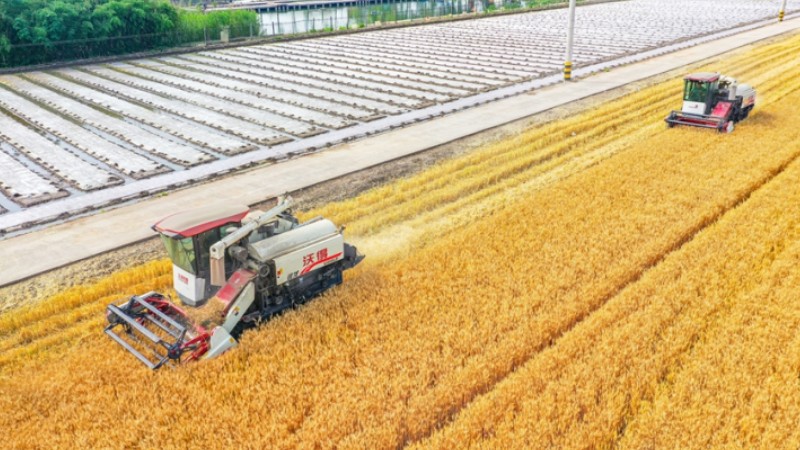RCEP pact's full implementation to benefit Asia-Pacific economies
MANILA, June 3 (Xinhua) -- The Regional Comprehensive Economic Partnership (RCEP) entered into force in the Philippines on Friday, marking a milestone of the world's largest free trade pact being fully effective for all 15 member countries.
"We see RCEP as a critical key toward inclusive economic growth, not only for the Philippines but within ASEAN," said Philippine Trade and Industry Secretary Alfredo Pascual.
Describing RCEP as "a modern, comprehensive, high-quality and mutually beneficial economic partnership," Pascual said the Philippines had secured enhanced market access for its key products such as preserved pineapples, durian, chocolate and ignition wiring sets.
The pact groups 10 Association of Southeast Asian Nations (ASEAN) members, China, Japan, South Korea, Australia and New Zealand. It is estimated to increase the Philippines' GDP by 2.02 percent after its participation, according to a study by the Philippine Institute for Development Studies.
FULL IMPLEMENTATION
For 29-year-old Jomar Abdon, who works in a durian processing facility in the Philippines' Davao City, access to the enormous Chinese market is a bonanza and will bring more workload as well as added income.
"More people will benefit from the proceeds," he said.
In April, the Philippines shipped the first batch of fresh durian fruits to China under a protocol signed in January, which opened up the fast-growing Chinese market to the tropical fruit that is widely grown in the Southeast Asian region.
The Chinese market has long been dominated by Thailand's signature golden pillow durian. According to the Ministry of Commerce of Thailand, China was the largest export market for Thai durians in 2022, accounting for over 96 percent of the total export volume, with a total value of 3.09 billion U.S. dollars.
Under the RCEP pact, the export of products like durians is not only facilitated by additional tariff reduction and elimination but also by trade facilitation measures to speed up the customs clearance procedures, which is especially beneficial for the trade of perishable products.
Also, durians and many other tropical delights from Southeast Asia are enjoyed by consumers in China as improved transportation networks like the China-Laos Railway provide faster fruit delivery services.
Abdon said it is good to have Puyat, one of the popular durian varieties in the Philippines' Davao that has a sweet taste and full-bodied flavor, recognized by China and exported there. Its production season is from February to April and from August to October every year, which can perfectly make up for the time when the golden pillow durian is not in season.
Allan Gepty, the Philippine lead negotiator in RCEP talks, said his country will gain benefits and opportunities in trade, goods, services and investments in RCEP. "We are now all set when it comes to its implementation."
"We are able to secure better market access for key products in China, South Korea, and Japan. In addition, we have other guaranteed market access for services for Filipinos," Gepty said at a press conference.
It is believed that RCEP will bring job opportunities for the Filipinos as it facilitates inclusive and open regional economic policies, especially for micro, small, and medium enterprises that can take advantage of the increasing globalization and creation of new supply chain linkages.
POSITIVE OUTLOOK
Since its entry into force in January 2022, RCEP has enhanced trade liberalization and investment facilitation, and strengthened regional supply chain and economic integration, said Auramon Supthaweethum, director-general of the Department of Trade Negotiations under Thailand's Ministry of Commerce.
Take Thailand as an example. The country's trade with other RCEP members rose 7.11 percent year on year to 300 billion U.S. dollars in 2022. In Cambodia, the RCEP agreement will hopefully help the country graduate from its least developed country status likely by 2028.
Joseph Matthews, a senior professor at the BELTEI International University in Phnom Penh, capital of Cambodia, said RCEP supports an open, free, fair, inclusive and multilateral trading system, and that it has helped strengthen supply chains in the region and promote the participation of micro, small and medium-sized enterprises in the regional value chains.
Moreover, RCEP also introduces the regional value chain that provides greater opportunities for manufactured products to participate in the global value chain, said Edi Prio Pambudi, Deputy for Coordination of International Economic Cooperation under the Indonesian Coordinating Ministry for Economic Affairs.
As Trade and Industry assistant secretary, Gepty said for the Philippines, the current challenge is to help stakeholders understand how to trade and do business in the region.
"Our professionals, our service providers, must understand how to seize the opportunities offered by the agreement, and for them to know how to invest in the RCEP region and protect their investments," he said.
Photos
Related Stories
Copyright © 2023 People's Daily Online. All Rights Reserved.









